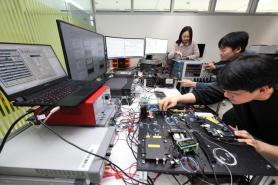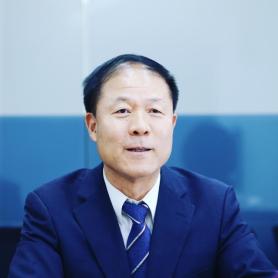
[Getty Image Bank]
SEOUL -- South Korea has secured an advantageous position in leading the international standardization of quantum information technology, which will have a profound impact on information and communications technology networks.
Quantum information is the state of a quantum system and can be processed using digital computers, transmitted from one location to another, manipulated with algorithms, and analyzed with computer science and mathematics. Quantum information technology is a class of emerging technology that improves information processing capability by harnessing principles of quantum mechanics.
Quantum information technology proposed by South Korea has been adopted under the theme of a white paper published by the International Electrotechnical Commission (IEC), an international standards organization, according to the Korean Agency for Technology and Standards (KATS), a government agency that leads national standards and technical evaluation.
IEC's Market Strategy Board publishes white papers and technology reports that predict future technology trends and analyze market needs to determine future standardization directions. The Seoul government will establish a new task force involving experts to push for the publication of IEC's 2021 white paper for quantum information technology.
"We will do our best to contribute to preoccupying overseas markets and strengthening export competitiveness by reflecting the technology of our companies in international standards," KATS head Lee Seung-woo said in a statement.
The white paper would include the market status of quantum information technology, R&D trends, direction and strategy for standardization, future vision, impact and recommendations on global industries and regulatory authorities, Lee's body said, adding it would help South Korea secure an advantageous position in international standardization and enhance its status in quantum information technology.
SK Telecom (SKT), a top mobile carrier in South Korea, offers specialized 5G services with ultra-low latency while addressing potential security threats with a quantum cryptographic communication solution. SKT's secure communications system for quantum-safe data protection has been applied to Korea Hydro & Nuclear Power (KHNP), the state-run operator of nuclear power plants, to address concerns about hacking and security threats.
Quantum cryptography has emerged as an essential security solution for safeguarding critical information in the 5G era. Data encoded in a quantum state is virtually unhackable without quantum keys which are basically random number tables used to decipher encrypted information. In February 2019, SKT acquired ID Quantique (IDQ), a Geneva-based leader in quantum-safe cryptography and quantum sensing solutions.
SKT has proposed standardizing methods of making pure random numbers that are unpredictable and patternless by utilizing quantum technologies. SKT's method will be used as a basis for generating passwords in a variety of security areas, especially to enhance the security of internet of things, self-driving cars and smart cities based on a 5G network.
South Korea has joined an international race to develop quantum computing technology and a practical five-qubit quantum computer by 2023. Binary digital electronic computers are based on transistors and capacitors with data encoded into binary digits (bits). Quantum computation uses quantum bits or qubits, based on the principles of quantum theory, which explains the nature and behavior of energy and matter on the quantum level.
Theoretically, a quantum computer would gain enormous processing power and perform tasks using all possible permutations simultaneously. Quantum computers have yet to solve a problem faster than a classical computer.
Copyright ⓒ Aju Press All rights reserved.



